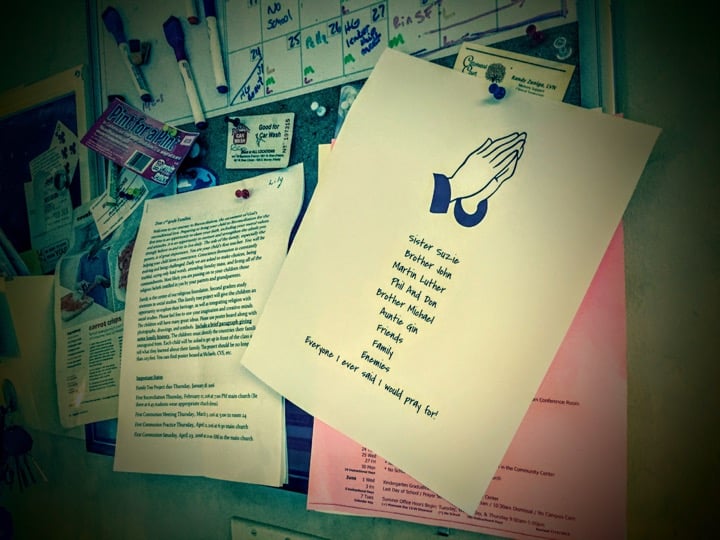 Copyright 2016 Kirk Whitney
Copyright 2016 Kirk Whitney
When someone shares news of a death, illness or personal difficulty, others often respond with a comment like “I’ll keep you in my prayers” or “ Our prayers go out to you.” Often these words comforting. They can also come off as an automatic response to the news you just shared.
I have been guilty of the latter. “I’ll pray for you” can be something to say when there’s nothing else to say. A way to move the conversation forward while expressing your sympathy. I’ve done that.
I was not insincere when telling people I would pray for them. I just didn't have much of a prayer life. I was making the offer to pray without a plan to carry it out. I also have to admit that for a long time, I didn’t know why I was making the offer or why it was important. That changed when I started to pray.
After decades of being negligent or at least, inconsistent, I finally cultivated a habit of daily prayer. Along with that habit came a prayer list. It’s not a formal list. I don’t have it written down anywhere. My list contains the usual suspects; family, friends, living and deceased and those who are in need of prayer due to illness or other crisis.
In addition to this core group, there are two other categories of people on my list. The first consists of anyone I have ever offered to pray for. I pray for them collectively and whenever possible, individually. Over the past few years, I have been able to recall more and more of those to whom I had made a prayer commitment. I now make an effort pray for them and about them as individuals.
Why start praying for people years after the offer to pray had been made and forgotten? On one level, it’s an attempt to restore the integrity of my word to others. On another, it’s an acknowledgement that God’s grace in not subject to the boundaries of time. It’s never too late to pray for someone.
How and why am I now recalling people to add to my list? Now that I am in my early sixties, I am approaching what Psychologist Erik Erikson describes as the quest for Ego Integration. This is the reflection on one’s past, the evaluation of one’s successes and failures. My mother called it woolgathering. Through this process of looking back, I often recall times when offered to pray for someone or should have.
Another factor has been the addition of meditative prayer daily routine. When I first committed to regular prayer, I started with what I knew. That was formal vocal prayer. The daily Rosary and the occasional Novena were my starting point.
My cultivation of meditative prayer grew out of the woolgathering I described earlier. I would find myself dwelling on past failures or regrets. I came to realize that worry, regrets and sorrow are thoughts that are pleading to become prayers. Now I ruminate less and pray more. When I think about the past, I will sometimes recall a person I haven’t thought about in years. When I do, I add them to the list. This is particularly important if it is someone I have been unkind to or wronged in some way.
Lastly is what you might call my “enemies list.” I’m not a president so I don’t have a real enemies list, but there are people that I pray for because of hateful views they espouse toward faith or people of faith. Some are celebrities who mock the notion of any belief in God, others are friends, family and acquaintances who buy into the notion that faith is a characteristic of mental frailty.
There are times when these attitudes should be countered head on, but sometimes, confrontation is not possible. Prayer is always possible.
I am amazed, for example, at the number of hateful and bigoted posts that show up on my Facebook feed. I have friends that engage in political and theological battles with some of these folks on line. They are good at it. I am not. I just get weary; then I pray.
I was both saddened and amused a few weeks ago by the uproar on Twitter and Facebook as people were mocked and attacked for offering to pray for the victims of the shooting in San Bernardino. The overall tone of some of these posts, tweets and even newspaper editorials suggested that prayer is pointless and superstitious. (While clicking “like” buttons and re-tweeting are rational and constructive.)
This anti-prayer chorus included a few people that appear in my Facebook and Twitter feeds. I didn’t post any nasty replies. I did not un-friend or un-follow any of them. But, I did add a few to my list.
Copyright 2016 Kirk Whitney
About the Author

Guest
We welcome guest contributors who graciously volunteer their writing for our readers. Please support our guest writers by visiting their sites, purchasing their work, and leaving comments to thank them for sharing their gifts here on CatholicMom.com. To inquire about serving as a guest contributor, contact editor@CatholicMom.com.


.png?width=1806&height=731&name=CatholicMom_hcfm_logo1_pos_871c_2728c%20(002).png)
Comments